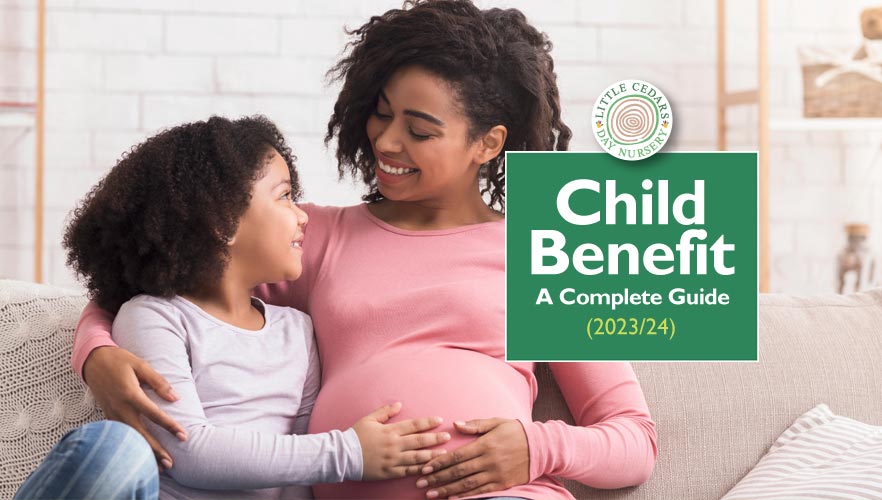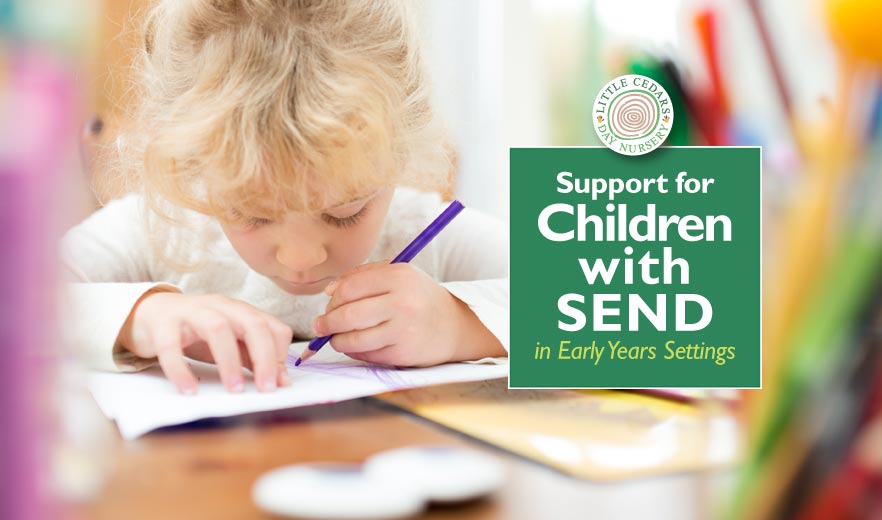
Today’s guide aims to explain everything you ever wanted to know about Child Benefit in the UK. This benefit could be a lifesaver with the current economy and interest rates being what they are. Learn the rules around eligibility, discover how much you can get, and see how many children you can claim for. We’ll also explain what impact your earnings may have, how long you can continue claiming for, and much more. So, if you’re responsible for bringing up a child, take a look!
What Is Child Benefit?
 Child Benefit is a financial support scheme, provided by the UK Government, that’s there to assist parents and guardians in covering the costs of raising children. It is an essential part of the social safety net in the United Kingdom and aims to help families with the financial responsibilities that come with bringing up children. Eligible families are free to spend Child Benefit however they like, whether that’s on children’s clothes, food, or something else.
Child Benefit is a financial support scheme, provided by the UK Government, that’s there to assist parents and guardians in covering the costs of raising children. It is an essential part of the social safety net in the United Kingdom and aims to help families with the financial responsibilities that come with bringing up children. Eligible families are free to spend Child Benefit however they like, whether that’s on children’s clothes, food, or something else.
Who is Eligible to Claim Child Benefit?
In the UK, Child Benefit is available to those primarily responsible for raising a child under the age of 16, or under 20 if they’re in approved education or training (N.B. that’s unless they get paid for working 24 or more hours per week instead, begin an apprenticeship, or claim certain benefits themselves).
Child Benefit is usually paid to the person who is primarily “responsible for the child’s care”.
To be eligible, you must be living in the UK, the child you’re claiming for must reside with you, and you must be spending at least the equivalent of the benefit you’ll receive on caring for your child (e.g. through food, clothes, etc.). Up to a certain level, income doesn’t affect eligibility (we’ll explain rules around income later in this guide*) and you do not need to be working. Note also that savings do not affect eligibility. Interestingly, you do not necessarily have to be the child’s parent in order to claim, although only one person can claim for a particular child.
More details about eligibility for Child Benefit can be found here, including some caveats, exceptions and special circumstances.
How Many Children Can You Claim For?
 You can claim Child Benefit for all of your children who meet the eligibility criteria. It may surprise some to learn that there are no restrictions on the number of children you can claim for (unlike with some other types of Government child support), so each eligible child in your care can be covered under this benefit.
You can claim Child Benefit for all of your children who meet the eligibility criteria. It may surprise some to learn that there are no restrictions on the number of children you can claim for (unlike with some other types of Government child support), so each eligible child in your care can be covered under this benefit.
How Much Do You Get?
For the 2023/24 tax year, the rates for Child Benefit have increased to the following levels:
• For the eldest or only child: £24.00 per week;
• For additional children: £15.90 per week for each additional child.
Example:
If you are responsible for looking after 3 eligible children, you will get 1 x £24 per week plus 2 x £15.90 each week. That amounts to £55.80 per week or £2901.60 per annum.
These rates can be a valuable contribution to your family’s finances and provide some relief from the costs associated with raising children. They are usually paid to you monthly, however, you may be able to arrange weekly payments in some circumstances. The money is paid directly to you and can be paid into most types of bank or building society accounts, with the exception of Post Office card accounts and Nationwide Cash Builder accounts with sort code 07 00 30 that are registered in someone else’s name.
* How Do Your Earnings Affect It?
 Child Benefit can be affected by your or your partner’s individual income if either of you earns over £50,000 annually. In such cases, you may have to pay a ‘High Income Child Benefit Tax Charge’. This charge gradually reduces your Child Benefit entitlement if your income is between £50,000 and £60,000. Indeed, if your income exceeds £60,000, you’ll likely have to repay the entire amount through this tax charge. We’ll cover more of the detail in the next section below…
Child Benefit can be affected by your or your partner’s individual income if either of you earns over £50,000 annually. In such cases, you may have to pay a ‘High Income Child Benefit Tax Charge’. This charge gradually reduces your Child Benefit entitlement if your income is between £50,000 and £60,000. Indeed, if your income exceeds £60,000, you’ll likely have to repay the entire amount through this tax charge. We’ll cover more of the detail in the next section below…
Is Child Benefit Subject to Income Tax?
Whether Child Benefit is subject to Income Tax depends on the level of you/your partner’s income:
- If you or your partner earn less than £50,000 per year, Child Benefit is not subject to Income Tax, i.e. it is tax-free.
- If you or your partner earn over £50,000 and no more than £60,000 per annum, you will need to repay 1% of your Child Benefit income for every £100 earned over the £50,000 threshold. This is done through a special kind of income tax called the ‘High Income Child Benefit Charge’.
- Because that equates to 10% for every £1000 of Childcare Benefit received, 100% of Childcare Benefit has to be repaid through the special income tax charge if you or your partner’s income reaches the upper (£60,000) threshold.
Is Child Benefit Affected by Universal Credit?
No, child benefit is not affected by anything you receive through Universal Credit. As separate schemes in their own right, each is paid independently of the other.
Can Child Benefit Contribute Towards Your State Pension?
Child Benefit will count towards your state pension National Insurance (NI) contributions if the child you are claiming for is under 12 and you are either not in work or do not have sufficient earnings for NI contributions. However, should you not need the NI State Pension credits yourself, you may be able to ask for them to be transferred to your partner/spouse in some circumstances.
How Do You Claim Child Benefit?
 Claiming Child Benefit is a straightforward process:
Claiming Child Benefit is a straightforward process:
- You can apply online through the official Government website. Fill out the necessary details and submit the form, and you should start receiving your payments within a few weeks. Learn more about how to claim online and what information you’ll need by watching this video.
- Alternatively, you can use a physical claim form. Two versions of the form exist: a CH2 form to use if you are claiming for up to two children and a CH2 (CS) form for any children in addition to those. Use the bold links to download and print out the forms if you decide to go with the ‘paper’ option.
Tip!
Payments can only be backdated by 3 months. It’s therefore wise to make any claim before your child reaches the age of 3 months.
How Long Can You Claim For?
You can usually claim this benefit until your child reaches the age of 16. However, if your child continues in approved education or training, you can still receive this benefit until they turn 20. As we said before, that’s unless they are paid for working 24 hours or more per week instead of their education or training.
Child Benefit is a crucial source of financial support, helping to ease the financial burden of raising children for eligible families. Be mindful of the income thresholds that may affect your entitlement, and ensure you claim it promptly to access the full value of this funding. Also, keep in mind that Government policies and rates may change over time, so it’s advisable to check the official Government website links above for the most up-to-date information on Child Benefit.
A Nursery Place for Your Child at Little Cedars Nursery, Streatham
Little Cedars is a Nursery & Preschool in Streatham, London SW16


At Little Cedars Nursery in Streatham, SW16, we are mindful of the significant costs associated with bringing up a child. We therefore support all Government-funded childcare schemes for eligible families. Parents/guardians can also rest assured that we’ll give babies, toddlers and preschoolers the very best start in life, in a warm, nurturing environment. And, as Ofsted agree, we are a good nursery and early years provider.
If you’d like to register your child for a nursery place, ask us a question or arrange a tour of the nursery/preschool with your little one, please get in touch — we’ll be delighted to help.
Our childcare service is based in Streatham near Tooting Common and the A214. As such, it is also conveniently located for families in Streatham Hill, Streatham Common, Streatham Park, Furzedown, Tooting, Balham, Norbury, Colliers Wood, West Norwood, Wandsworth, Clapham and Brixton.


 Identification of a special educational need or disability is, of course, the first step in being able to properly support a child with SEND. For this reason, good early years providers like Little Cedars Nursery will, as a matter of course, watch out for signs of things that might be challenging for children. As prescribed by
Identification of a special educational need or disability is, of course, the first step in being able to properly support a child with SEND. For this reason, good early years providers like Little Cedars Nursery will, as a matter of course, watch out for signs of things that might be challenging for children. As prescribed by  Support plans for suspected or confirmed special needs or disabilities are then discussed and custom-designed for the child. Such plans will be agreed between the child’s parents/caregivers, staff at the early years setting itself and any external specialists or professionals involved in the child’s care. Such programmes will be customised to suit the individual child’s specific needs and may include tailored activities, strategies, resources and so on. Formalisation of the support programme will allow all parties to pull in the same direction, working cooperatively for the benefit of the child.
Support plans for suspected or confirmed special needs or disabilities are then discussed and custom-designed for the child. Such plans will be agreed between the child’s parents/caregivers, staff at the early years setting itself and any external specialists or professionals involved in the child’s care. Such programmes will be customised to suit the individual child’s specific needs and may include tailored activities, strategies, resources and so on. Formalisation of the support programme will allow all parties to pull in the same direction, working cooperatively for the benefit of the child. In parallel to the SENCo at the child’s early years setting, local authorities also have their own Special Educational Needs Coordinator, known as the Area SENCo. They will also be integral to a child’s SEND support plan, helping with coordination between the local authority, the various parties involved in supporting the child, and in relation to any special funding requirements. If approved, special funding might be required, for example, for an additional member of staff tasked with giving one-to-one support to the child, or to fund extra learning resources and activities for them.
In parallel to the SENCo at the child’s early years setting, local authorities also have their own Special Educational Needs Coordinator, known as the Area SENCo. They will also be integral to a child’s SEND support plan, helping with coordination between the local authority, the various parties involved in supporting the child, and in relation to any special funding requirements. If approved, special funding might be required, for example, for an additional member of staff tasked with giving one-to-one support to the child, or to fund extra learning resources and activities for them. All 3- and 4-year-olds living in England are eligible for a minimum of 570 hours of free childcare per annum, irrespective of whether or not they have SEND. This is known as Universal Free Childcare or their Free entitlement and is typically taken as 15 hours of childcare each week over 38 weeks of the year, but how it is taken can differ.
All 3- and 4-year-olds living in England are eligible for a minimum of 570 hours of free childcare per annum, irrespective of whether or not they have SEND. This is known as Universal Free Childcare or their Free entitlement and is typically taken as 15 hours of childcare each week over 38 weeks of the year, but how it is taken can differ. 